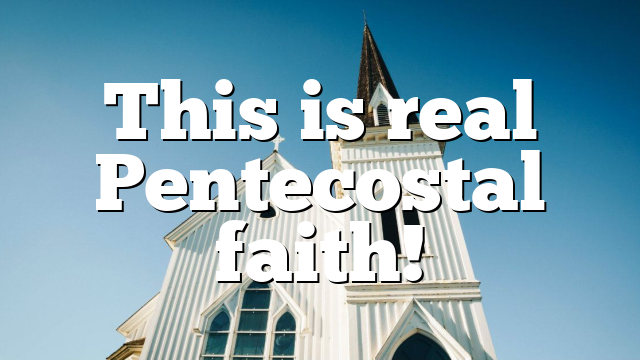Within the vast tapestry of Christianity, Pentecostal churches occupy a vibrant and dynamic niche, characterized by a fervent emphasis on the Holy Spirit’s active participation in the lives of believers. These communities are often likened to living, breathing organisms, pulsating with spiritual vitality, as they embrace experiences that transcend the mundane and venture into the miraculous. The radiant flame of Pentecostal faith ignites the hearts of adherents, fostering a distinct form of worship that is both deeply personal and profoundly communal.
The roots of Pentecostalism can be traced back to the early 20th century, during a period marked by spiritual revival and theological exploration. The Azusa Street Revival in Los Angeles, a significant milestone in this movement, became a crucible for a new understanding of Christian experience, where the supernatural became an integral aspect of faith. At its core, Pentecostalism prioritizes an experiential relationship with God, underscored by the belief in the baptism in the Holy Spirit, often evidenced by glossolalia or speaking in tongues. This phenomenon serves as an intriguing metaphor for the divine communication that transcends human limitations, showcasing a language that is both unuttered and deeply expressive.
The essence of Pentecostal faith can be encapsulated in the concept of “spirit-filled living.” In the Pentecostal view, the Holy Spirit is not a distant, abstract figure but an imminent presence that actively engages with believers. This engagement manifests in various forms, including prophetic utterances, divine healings, and miraculous interventions, all of which underscore the vitality of faith as a living experience rather than a mere intellectual assent. The church becomes a sanctuary of supernatural encounters, where believers are encouraged to expect the extraordinary.
One of the remarkable attributes of Pentecostal churches is their inclusivity. Unlike some denominations that may rigidly adhere to tradition, Pentecostalism embraces a diverse array of expressions. Individuals from various cultural, ethnic, and socio-economic backgrounds come together, united by a shared pursuit of spiritual renewal. This melange fosters a sense of belonging, as congregants participate in communal worship that often includes lively music, dance, and prophetic declarations. The worship experience becomes a kaleidoscope of expressions, each reflecting the multifaceted nature of human encounter with the Divine.
Moreover, this movement underscores the concept of empowerment. Pentecostals believe that the Holy Spirit equips believers not only for personal transformation but also for missional living. The infilling of the Spirit galvanizes individuals to engage in acts of service, evangelism, and social justice. Each believer becomes a conduit of divine love, equipped to impact their communities with transformative grace. In this context, faith transcends the walls of the church, spilling into homes, schools, and workplaces, manifesting itself in tangible acts of compassion and ministry.
Yet, the embrace of emotional fervor and miraculous experiences is sometimes met with skepticism and critique. Detractors often question the authenticity of such experiences, viewing them through a lens of rationalism that tends to prioritize empirical evidence over experiential knowledge. However, the Pentecostal response is not merely defensive but rather an invitation to explore the depths of a relationship with God that defies conventional understanding. For those who have tasted the living waters of the Spirit, the supernatural is not an anomaly but an integral facet of their everyday existence—a tapestry woven with threads of faith, mystery, and divine love.
Another distinctive feature of Pentecostal churches is the centrality of worship as both a corporate and individual experience. Worship gatherings are often characterized by spontaneous expressions of praise—clapping, shouting, and spontaneous singing are commonplace. This environment cultivates an atmosphere where the Spirit’s movement is palpable, encouraging believers to surrender themselves fully to God’s presence. Here, worship transcends the mere singing of hymns; it becomes a symphony of souls drawn together in an ascending chorus of adoration. Such environments foster unity, as participants collectively journey towards a transcendent encounter with their Creator.
The interpretation of Scripture within Pentecostalism also reflects a unique lens. While remaining rooted in biblical authority, Pentecostals often approach the text with an expectation of revelation and applicability. The Scriptures are viewed not just as historical documents but as living words, capable of transformation and insight for the present moment. Many Pentecostals engage in what is often referred to as “spiritual hermeneutics,” seeking the Holy Spirit’s guidance in interpreting and applying biblical teachings to contemporary challenges. This dynamic engagement creates a vibrant dialogue between the ancient and the modern, affirming the belief that God speaks afresh to each generation.
Lastly, it is worth noting the eschatological dimensions of Pentecostal belief. Many within this movement hold a sense of urgency regarding the return of Christ and the fulfillment of God’s promises. This eschatological hope serves as a motivating force, propelling believers to actively share their faith and live out the tenets of love, grace, and truth in a world yearning for redemption. In this light, every believer becomes an ambassador of hope, tasked with heralding the message of a transcendent Kingdom.
In conclusion, Pentecostal churches embody a rich tapestry of faith, woven together by experiences of the Holy Spirit that enliven and empower believers for transformative living. Their unique appeal lies in a dynamic, spirit-filled faith that invites individuals into a profound encounter with the Divine, fostering a community that radiates love, joy, and missional fervor. In a world often marked by skepticism and despair, Pentecostalism stands as a vibrant testament to the possibilities of faith, a beacon of hope illuminating the path toward authentic spiritual engagement and communal transformation.



